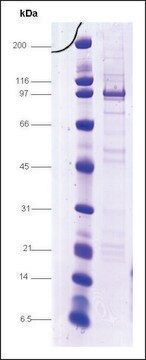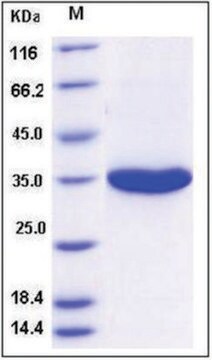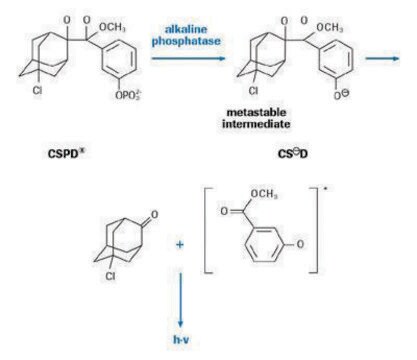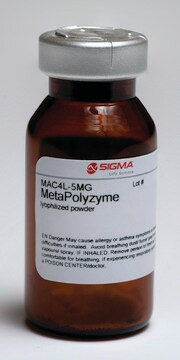SRP2123
Sp1 (GC-box binding protein), GST tagged human
recombinant, expressed in E. coli, ≥70% (SDS-PAGE)
Faça loginpara ver os preços organizacionais e de contrato
About This Item
Código UNSPSC:
12352202
NACRES:
NA.26
Produtos recomendados
fonte biológica
human
recombinante
expressed in E. coli
Ensaio
≥70% (SDS-PAGE)
Formulário
frozen liquid
peso molecular
~62.8 kDa
embalagem
pkg of 10 μg
condição de armazenamento
avoid repeated freeze/thaw cycles
concentração
300 μg/mL
cor
clear colorless
nº de adesão NCBI
nº de adesão UniProt
Condições de expedição
dry ice
temperatura de armazenamento
−70°C
Informações sobre genes
human ... SP1(6667)
Descrição geral
Sp1 is a sequence-specific DNA-binding protein and a eukaryotic transcription factor. It is a ubiquitously expressed nuclear protein. It is one of the first transcription factors to be identified, and the first whose gene was cloned. It was identified as a host factor in HeLa cells, which interacted with the GC-rich sites in SV40 (Simian virus 40) early promoter, and was crucial for in vitro transcription of this promoter. Sp1 is a single polypeptide chain composed of 778 amino acids, and has a molecular weight of 105kDa.
Ações bioquímicas/fisiológicas
Sp1 binds to GC-rich sequences in a wide variety of promoters. It interacts with cell type or stage-specific transcription factors, and thus, regulates transcription of specific genes. It also controls the formation of the transcription initiation complex. This protein plays a key role in controlling the basal levels of glutathione S-transferase (GSTP1) promoter and the expression of leukotriene C4 synthase gene in the THP-1, a monocyte-like cell line.
Sp1 was first detected in HeLa cells on the basis of its ability to activate the SV40 early promoter transcription. Subsequently it was shown to recognize and bind selectively to a GC-rich consensus sequence (GC-box: GGGCGG or CACCC) that presents in the promoter of several important cellular genes, including SV40 early, HIV-1, PDGF-B etc. Sp1 was the first transcription factor to be cloned and. Analysis of structure and function has revealed that Sp1 can be separated into discrete functional domains. The DNA-binding domain consists of three zinc fingers that specifically bind to the GC-box element. Sp1 contains at least four separate transcriptional activation domains. Two of these domains are glutamine-rich, a well-characterized motif found in several other transcription factors. In addition to transcription, Sp1 function has been linked to cell growth, cancer, Huntington disease and other disorders through transcriptional regulation or specific protein-protein interactions. The function of Sp1 can be regulated by phosphorylation and glycosylation.
forma física
Clear and colorless frozen liquid solution
Nota de preparo
Use a manual defrost freezer and avoid repeated freeze-thaw cycles. While working, please keep sample on ice.
Código de classe de armazenamento
10 - Combustible liquids
Classe de risco de água (WGK)
WGK 1
Ponto de fulgor (°F)
Not applicable
Ponto de fulgor (°C)
Not applicable
Escolha uma das versões mais recentes:
Certificados de análise (COA)
Lot/Batch Number
Não está vendo a versão correta?
Se precisar de uma versão específica, você pode procurar um certificado específico pelo número do lote ou da remessa.
Já possui este produto?
Encontre a documentação dos produtos que você adquiriu recentemente na biblioteca de documentos.
New insights into the multiple functions of Spl, a ubiquitous transcription factor.
Parnaik VK
Current Science, 76(2), 166-172 (1999)
Sp1 and Sp3 function as key regulators of leukotriene C(4) synthase gene expression in the monocyte-like cell line, THP-1.
Serio KJ et al
American Journal of Respiratory Cell and Molecular Biology, 23(2), 234-240 (2000)
Sp1-mediated transcriptional activation of the human Pi class glutathione S-transferase promoter.
Moffat GJ et al
The Journal of Biological Chemistry, 271(2), 1054-1060 (1996)
J T Kadonaga et al.
Cell, 51(6), 1079-1090 (1987-12-24)
Transcription factor Sp1 is a protein present in mammalian cells that binds to GC box promoter elements and selectively activates mRNA synthesis from genes that contain functional recognition sites. We have isolated a cDNA that encodes the 696 C-terminal amino
M R Briggs et al.
Science (New York, N.Y.), 234(4772), 47-52 (1986-10-03)
The biochemical analysis of cellular trans-activators involved in promoter recognition provides an important step toward understanding the mechanisms of gene expression in animal cells. The promoter selective transcription factor, Sp1, has been purified from human cells to more than 95
Nossa equipe de cientistas tem experiência em todas as áreas de pesquisa, incluindo Life Sciences, ciência de materiais, síntese química, cromatografia, química analítica e muitas outras.
Entre em contato com a assistência técnica








